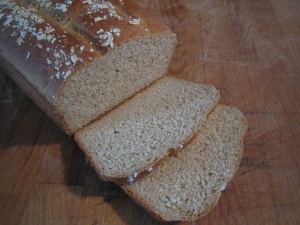They go together like bread and…butter. You’ll see.
Let’s start with a loaf of Scottish oat bread. Simple brown bread, but is it? I can teach Toddler Harbat how to mix the ingredients, the order of rising, forming, baking, cooling. But she won’t really learn how to make bread. She’ll have to, like me, think she’s better than the system and then come up with her own method. Maybe it’ll be better than mine. I like to think so. When it comes to teaching TH, I want to teach her that experience comes from experimentation, failure, and bravery. I’ve made a lot of so-so breads, and some spectacular failures. If I had just followed books and recipes to the letter, I would’ve been safer, but wouldn’t have learned anything except how to follow a program like a robotic arm that welds auto parts.
Last night I got to return to my alma mater to do desk critiques of students in the final leg of their undergraduate program, burning midnight oil and worrying their fingernails to stubs trying to complete their thesis projects. I went through this same thing and remember the good jurors as well as the horrible. What you need most as a student is reassurance that you’re brave for making what could be a spectacular failure or a spectacular success. Our culture puts such a high value on success that it forgets that education comes from failure. And fear of failure is the straightest path to mediocrity I know.
As I teach Toddler Harbat how to make bread, I should let her try her own thing. When she experiments and succeeds, it’ll be worth a thousand times more than some lesson I’ve passed on to her.


It's always the journey, not the destination that has the most value. It's also the risk takers and those willing to fail who create the most innovative projects. You've got the right ideas. I recall your bright green 98% salt and 2% "biscuits" that we all said were delicious. And look what you can cook now!